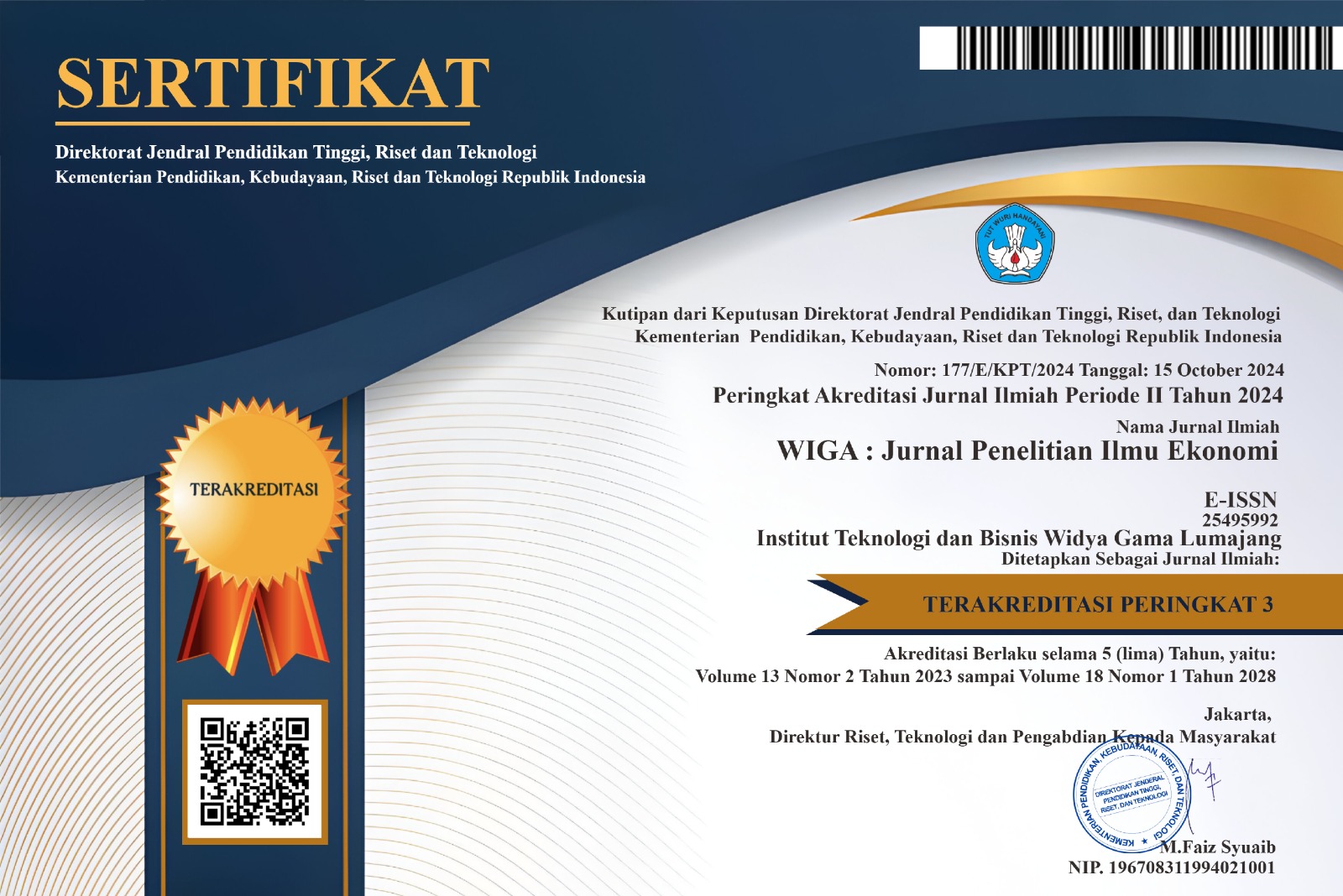The Coffee Business Management with Islamic Symbols: Total Motivation Model and Shari’ah Enterprise Theory Approach
DOI:
https://doi.org/10.30741/wiga.v12i1.787Keywords:
Coffee Company, Islamic Symbol, Qualitative StudyAbstract
There is a coffee product under the brand BIKLA. This coffee is produced by the Pesantren (Islamic boarding school) cooperative located in Bangsalsari District, Jember Regency. This coffee is unique because on the front packaging it says "Barokah Ibrahimy", while on the back packaging it says "Barokah Rotibul Haddad from the students (santri). The purpose of this research is (1) exploring the application of business management in BIKLA coffee company; (2) explore the alignment of the implementation of business management in BIKLA coffee company with Total Motivation Model and Shari’ah Enterprise Theory. This research uses qualitative methods with a case study approach. Data is obtained by in-depth interviews and observations. The results showed that the company implemented collaborative business management, namely the merger of business management aimed for commercial and afterlife for production activities, human resource management, marketing, and finance. The application of business management on BIKLA coffee company can be in line with Shari’ah Enterprise Theory and with the Total Motivation Model
Downloads
References
Alma, B., Priansa, D. J. (2014). Manajemen Bisnis Syariah. Alfabeta: Bandung
Alserhan, B.A. (2010b), “Islamic branding: a conceptualization of related terms”, Journal of Brand Management, Vol. 18 No. 1, pp. 34-49
Ather, MS., Aktaruzzaman Khan, M., & Hoque, N. (2011). Motivation as conceptualised in traditional and Islamic management. Humanomics, 27(2), 121–137. https://doi.org/10.1108/08288661111135126
Bandur, A. (2016). Penelitian Kualitatif: Metodologi, Desain, dan Teknik Analisis Data dengan NVIVO11 Plus. Mitra Wacana Media: Jakarta
Djazuli, HA, Kaedah-Kaedah Fiqh : Kaedah-kaedah Hukum Islam dalam Menyelesaikan Masalah-masalah yang Praktis, (Jakarta : Kencana Prenada Media Group, 2011), Cet. IV
Putri, SU. (2020). Analisis Akuntabilitas Berbasis Shari’ah Enterprise Theory untuk Pengembangan Bisnis Rumah Jahit Akhwat di Makasar. NUKHBATUL ‘ULUM: Jurnal Bidang Kajian Islam Vol. 6, No. 2 (2020) : Hal. 187-203
Hijriah, H. Y. (2016). Spiritualitas Islam dalam Kewirausahaan. Tsaqafah, 12(1), 187. https://doi.org/10.21111/tsaqafah.v12i1.374
Islam, MM. 2020. Segmenting, targeting and positioning in Islamic marketing. Journal of Islamic Marketing. Vol 12. No. 7. doi 10.1108/JIMA-10-2018-0181
Kalbarini, R. Y. (2018). Implementasi Akuntabilitas dalam Shari’ah Enterprise Theory di Lembaga Bisnis Syari’ah (Studi Kasus: Swalayan Pamella Yogyakarta). Al-Tijary, 4(1), 1–12. https://doi.org/10.21093/at.v4i1.1288
Kusdewanti, A. I., & Hendrawaty, R. (2019). Memaknai Manajemen Bisnis Islami Sebagai Kehidupan Yang Menghidupi. IMANENSI: Jurnal Ekonomi, Manajemen Dan Akuntansi Islam, 2(1), 32–50. https://doi.org/10.34202/imanensi.2.1.2014.32-50
Madjid, St. S. (2018). Prinsip-Prinsip (Asas-Asas) Muamalah. J-HES Jurnal Hukum Ekonomi Syariah Volume 2, No. 1, hal. 14-28.
Maesaroh, Mamay. (2019). Intensitas Dzikir Ratib Al-Haddad dan Kecerdasan Spiritual SantriIrsyad : Jurnal Bimbingan, Penyuluhan, Konseling, dan Psikoterapi Islam Vol 7 No 1, hal. 61-84
Maleha, N. Y. (2016). Manajemen bisnis dalam Islam. Economica Shari’ah. Vol 1 No. 2, hal. 43–54.
Musa, M. A., Sukor, M. E. A., Ismail, M. N., & Elias, M. R. F. (2020). Islamic business ethics and practices of Islamic banks: Perceptions of Islamic bank employees in Gulf cooperation countries and Malaysia. Journal of Islamic Accounting and Business Research, 11(5), 1009–1031. https://doi.org/10.1108/JIABR-07-2016-0080
Puspitasari, Novi. 2018. Keuangan Islam. Yogyakarta: UII Press
Rofiaty, R. (2019). The relational model of entrepreneurship and knowledge management toward innovation, strategy implementation and improving Islamic boarding school performance. Journal of Modelling in Management, 14(3), 662–685. https://doi.org/10.1108/JM2-05-2018-0068
Sugiyono.(2011). Metode Penelitian Kuantitatif Kualitatif dan R&D. Alfabeta: Bandung
Triyuwono, I. Metafora Zakat dan Shari'a Enterprise Theory sebagai Konsep Dasar dalam Membentuk AKuntansi Syariah (2001). Jurnal Akuntansi dan Auditing Indonesia. Vol 5 Nomor 2, hal. 131–145.
Utama, R. E. (2020). Strategi Pembiayaan Pesantren Melalui Pemberdayaan Ekonomi Umat. Jurnal Tahdzibi: Manajemen Pendidikan Islam Volume 5 No. 2 November 2020. Hal. 117-134. P-ISSN : 2502 - 9398 e-ISSN : 2503 - 5126
Downloads
Published
How to Cite
Issue
Section
License
Copyright (c) 2022 Novi Puspitasari

This work is licensed under a Creative Commons Attribution-ShareAlike 4.0 International License.










